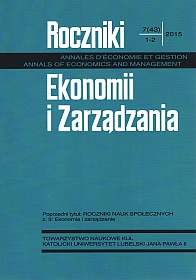Consumer Response to CSR Announcements
Abstract
Companies engaging in CSR activities usually announce about this public not always are aware of results of these messages. As a test of credibility an independent information source can be used. Too intensive and pushy notification about dubious CSR initiatives can be perceived as company hypocrisy. As the results of own studies suggests a negative response to CSR announcement can be identify particularly among people who possess conservative attitude to reality.
References
Arvidsson S.: Communication of Corporate Social Responsibility: A study of the Views of Management Teams in Large Companies, “Journal of Business Ethics” 96(2010), pp. 339-354.
Benoit-Moreau F., Parguel B.: Building brand equity with environmental communication: an empirical investigation in France, “EuroMed Journal of Business” 6(2011), No. 1, pp. 100-116.
Carroll A.B.: Corporate Social Responsibility: Evolution of Definitional Construct, “Business & Society” 38(1999), No. 3, pp. 268-295.
Chen H., Zhang H.: Two-way communication strategy on CSR information in China, “Social Responsibility Journal” 5(2009), No. 4, pp. 2009.
Davis D., MacDonald J.B.: Improving the Promotion of CSR Initiatives: A Framework for Understanding Stakeholder Communications from a Dynamic Learning Perspective, “Academy of Marketing Studies Journal” 15(2010), No. 2, pp. 77-93.
Farache F., Perks K.J.: CSR advertisements: a legitimacy tool?, “Corporate Communications: An International Journal” 15(2010), No. 3, pp. 235-248.
Fassin Y., Buelens M.: The hypocrisy-sincerity continuum in corporate communication and decision making. A model of corporate social responsibility and business ethics practices, “Management Decision” 49(2011), No. 4, pp. 586-600.
Groza M.D., Pronschinske M.R., Walker M.: Perceived Organizational Motives and Consumer Responses to Proactive and reactive CSR, “Journal of Business Ethics” 102(2011), pp. 639-652.
Matten D., Moon J.: ‘Implicit’ and ‘Explicit’ CSR: A conceptual framework for a comparative understanding of corporate social responsibility, “Academy of Management Review” 23(2008), issue 1, pp. 27-33.
Nielsen A.E., Thomsen Ch.: CSR communication in small and medium-sized enterprises. A study of the attitudes and beliefs of middle managers, “Corporate Communications: An International Journal” 14(2009), No. 2, pp. 176-189.
Parguel B., Benoit-Moreau F., Larceneux F.: How Sustainablility Ratings Might Deter ‘Greenwashing’: A Closer Look at Ethical Corporate Communication, “Journal of Business Ethics” 102(2011), pp. 15-28.
Pawlak M., Liu Sh.-Ch., Dimitrova V.: MANAGEMENT STUDENTS’ VALUES AND OPINIONS ABOUT CSR, “Proceedings of the Southwest Decision Sciences Forty-Fifth Annual Meeting” 2014, March 11-March 15 [Dallas, Texas].
Quairel-Lanoizelée F.: Are competition and corporate social responsibility compatible? The myth of sustainable competitive advantage, “Society and Business Review” 6(2011), No. 1, pp. 77-98.
Schwartz Sh.H.: Studying Values: Personal Adventure, Future Directions, “Journal of Cross-Cultural Psychology” 42(2011), No. 2, pp 307-319.
Swaen V., Vanhamme J.: The Use of Corporate Social Responsibility Arguments in Communication Campaigns: Does Source Credibility Matter?, “Advances in Consumer Research” 32(2005), pp. 590-591.
Wang L., Juslin H.: Values and Corporate Social Responsibility Perceptions of Chinese University Students, “Journal of Academic Ethics” 10(2012), issue 1, pp. 57-82.
Copyright (c) 2015 Roczniki Ekonomii i Zarządzania

This work is licensed under a Creative Commons Attribution-NonCommercial-NoDerivatives 4.0 International License.


